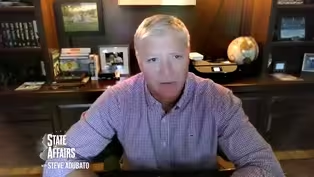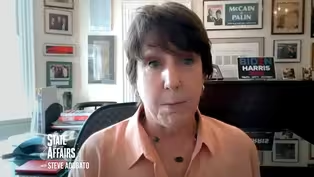State of Affairs with Steve Adubato
The Significant Complications of Living With Diabetes
Clip: Season 7 Episode 14 | 8m 21sVideo has Closed Captions
The Significant Complications of Living With Diabetes
Ginine Mohamad Cilenti, Executive Director of Diabetes Foundation, joins Steve Adubato to address the significant complications of living with diabetes, managing the disease, and the communities that are disproportionately impacted.
Problems playing video? | Closed Captioning Feedback
Problems playing video? | Closed Captioning Feedback
State of Affairs with Steve Adubato is a local public television program presented by NJ PBS
State of Affairs with Steve Adubato
The Significant Complications of Living With Diabetes
Clip: Season 7 Episode 14 | 8m 21sVideo has Closed Captions
Ginine Mohamad Cilenti, Executive Director of Diabetes Foundation, joins Steve Adubato to address the significant complications of living with diabetes, managing the disease, and the communities that are disproportionately impacted.
Problems playing video? | Closed Captioning Feedback
How to Watch State of Affairs with Steve Adubato
State of Affairs with Steve Adubato is available to stream on pbs.org and the free PBS App, available on iPhone, Apple TV, Android TV, Android smartphones, Amazon Fire TV, Amazon Fire Tablet, Roku, Samsung Smart TV, and Vizio.
Providing Support for PBS.org
Learn Moreabout PBS online sponsorship[INSPRATIONAL MUSIC STING] - Hi everyone.
Steve Adubato.
Let's kick off the program with Ginine Mohamad Cilenti.
She's the executive director of the Diabetes Foundation.
Good to see you, Ginine.
- Good to see you too.
Thanks for having me.
- You got it.
We're actually gonna put up the website for the Diabetes Foundation.
Explain to folks what the foundation is and then we're gonna talk about how prevalent diabetes is.
- Okay, great.
Thank you.
So the Diabetes Foundation, we offer many services across the state of New Jersey.
What's important to know is that we are the only one stop shop for free personalized diabetes care across the state.
So, we help individual-- we help children.
We help adults.
We help individuals who are insured, who are uninsured.
We help individuals living with any type of diabetes.
And our goal is to help people get the care they need every day to manage their blood sugar.
We have three different buckets of services that are truly important.
One is financial assistance, because diabetes is really, really expensive to live with.
So we offer free emergency insulin- - Hold on.
Why is that?
- Why is that?
- Why is it expensive to live with?
- Cost of insulin.
Cost of the medications are very expensive.
Even eating healthy is very expensive.
So, it's an expensive- - And the two other buckets, I'm sorry for interrupting.
Go ahead.
The two other buckets.
- Okay.
The two other buckets are, so it's financially, but it's also physiologically difficult because it's progressive disease.
And then lastly, it's emotionally difficult, because you're living with it every single day.
So our services for those two areas include, you know, we have peer-to-peer support groups so people can build a network of care and manage their diabetes every day.
And we additionally have accredited education through the Association of Diabetes Educators that teach people about healthy eating and activity and medication management and things that help them manage their condition over time.
- Let's do this.
It's a progressive disease, correct?
- Yes.
- And there are family members who I know watch this program, many family members on my end who have diabetes or pre-diabetes, if you will.
If not dealt with effectively, efficiently, appropriately, this is a terrible disease, is it not?
- The complications are abundant.
Diabetes is a very high rate of, when you live with diabetes, kidney disease.
You have a high rate of developing kidney disease, lower leg amputation, adult onset blindness, heart attack and stroke.
So managing your blood sugar diligently becomes very important.
- And it also, in terms of disproportionately affecting communities of color, talk about that, please.
- Absolutely.
So, data shows that communities of color are definitely disproportionately affected.
So, I just read a CDC study from 2019 that non-Hispanic African-American adults have a 60% higher prevalence for diabetes than non-Hispanic white adults.
- Why is that?
- You know, there are many reasons.
I mean, some of them are environmental.
Some of them are biological.
So, by environmental, I mean, are you living in a community with access to, you know, healthy, fresh produce- - Or a food desert where there isn't access?
I'm sorry, go ahead.
- Exactly.
Is there walkability?
Are there access to healthcare providers?
Do you have health insurance?
And then, in terms of biological, do you have a propensity for weight or high cholesterol or high blood pressure?
- Complicated stuff.
Again, let's keep up putting up the website for the Diabetes Foundation.
I'm curious about this, funding.
We're an not-for-profit.
You're an not-for-profit.
Your dollars come from where?
- Our dollars come from individuals.
They come from organizations, foundations, such as the Horizon Foundation and other great foundations.
And lastly, we're able to obtain state support through the Department of Health.
- I was just gonna ask you that.
So, there is government funding of the diabetes, and that's the Department of Health?
- Yes, it's the Department of Health.
They're funded through the federal government to do diabetes education and self-management programs.
And the diabetes foundation's lucky enough to provide one of those services.
- Personal support.
Describe what that means.
- Oh boy.
Personal support is so important.
Today, one in 10 people are living with diabetes, and if trends continue, the CDC is stating that by 2050 one in three people will be living with diabetes.
And how do you live healthy?
It's about knowing your own body, right?
It's about successfully understanding how food impacts you, how activity impacts you, how your medications impact you.
So, personally, obtaining information and getting tools to put in your toolbox to help you live healthy is extremely important.
- How'd you get into this?
- I have an affinity for helping individuals who are unable to access care anywhere else.
I have a background in, you know, my father has type two diabetes.
My grandmother died of complications due to type one, and for my grandmother for example, she did not have access to insulin.
She couldn't afford it.
And it cut her life short.
She died before she was 51 years old.
And I got into this because I wanna make sure that that doesn't happen to anybody else.
- Managing diabetes.
What does that really mean, to manage it?
And I know the insulin's a part of it, but it's just a part of it.
Please.
- Again, it's about understanding your body.
So, there are many different factors to managing your health.
There's, you know, there's definitely the medication management like you're talking about, but monitoring your blood sugar.
There's eating healthy, being active, coping.
Stress is a huge factor that increases blood sugar.
So, how do you learn to cope with your stress?
And that's another big factor.
And lastly, it's really just understanding your risk factors and then how to problem solve if you are not feeling well.
- But, go back to the beginning, meaning screening.
Screening for diabetes is really important, because early detection matters?
- Yes, absolutely.
So, if you, the longer you go, like we spoke about in the beginning, diabetes is progressive.
So the longer you go without knowing that you have diabetes, the longer the disease is impacting your body.
So, to get screened early on to know where you are is truly important to your lifelong success in managing your health.
- So important.
Again, one more time, let's put up the website for the Diabetes Foundation.
And we will continue to do work in this area in terms of public awareness.
And we look forward to having you on again, Ginine.
Ginine Mohamad Cilenti, executive director of the Diabetes Foundation.
Ginine, thank you so much for joining us.
We appreciate it.
- Thank you.
Have a great day.
- You too.
Stay with us.
We'll be right back.
- [Narrator] State of Affairs with Steve Adubato Is a production of the Caucus Educational Corporation.
Funding has been provided by Horizon Blue Cross Blue Shield of New Jersey.
The Healthcare Foundation of New Jersey.
The Russell Berrie Foundation.
New Brunswick Development Corporation.
New Jersey'’s Clean Energy program.
PSC.
The New Jersey Education Association.
Atlantic Health System.
And by The New Jersey Economic Development Authority.
Promotional support provided by ROI-NJ.
And by New Jersey Globe.
- (Narrator) New Jersey is home to the best public schools in the nation, and that didn't happen by accident.
It's the result of parents, educators and communities working together year after year to give our students a world class education.
No matter the challenge, because parents and educators know that with a shared commitment to our public schools, our children can learn, grow and thrive.
And together, we can keep New Jersey's public schools the best in the nation.
Reducing the Carbon Footprint of Natural Gas
Video has Closed Captions
Clip: S7 Ep14 | 8m 46s | Reducing the Carbon Footprint of Natural Gas (8m 46s)
Violence Towards Women in Politics and Proper Representation
Video has Closed Captions
Clip: S7 Ep14 | 10m 35s | Violence Towards Women in Politics and Proper Representation (10m 35s)
Providing Support for PBS.org
Learn Moreabout PBS online sponsorship
- News and Public Affairs

Top journalists deliver compelling original analysis of the hour's headlines.

- News and Public Affairs

FRONTLINE is investigative journalism that questions, explains and changes our world.












Support for PBS provided by:
State of Affairs with Steve Adubato is a local public television program presented by NJ PBS

